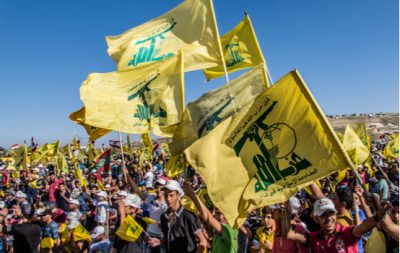Israel Threatened All Lebanese When It Equated Their State with Hezbollah

An Israeli security cabinet minister ominously wrote on Twitter that “Hezbollah=Lebanon” and promised that “The State of Israel will not differentiate between the sovereign State of Lebanon and Hezbollah, and will view Lebanon as responsible for any action from within its territory”.
Education Minister Naftali Bennett was responding to Hezbollah’s impressive gains in the first Lebanese elections in nearly a decade, which proved that many of its citizens are solidly standing with the Resistance organization and embrace its anti-Zionist ideology. This understandably scares Israel but can also be seen as a perfect example of confirmation bias by it in fear mongering that Iran has taken over Lebanon via proxy, disregarding the fact that Hezbollah is its own independent organization despite being closely allied with the Islamic Republic and fighting shoulder-to-shoulder with its elite Islamic Revolutionary Guard Corps (IRGC) in neighboring Syria.
The conflating of all Lebanese civilians with Hezbollah and then in turn drawing no distinction between them and Israel’s Iranian state enemies is alarming because it suggests that Tel Aviv is preconditioning the global public to accept its military’s indiscriminate targeting of civilians in any forthcoming war with Hezbollah and/or Iran on the basis that the democratic expression of a foreign population’s support for a group that Israel regards as “terrorists” makes them “legitimate” wartime targets. The support that many Lebanese have for Hezbollah isn’t entirely ideologically driven either but is also rooted in the organization’s socio-economic activities on the local level, which many observers tend to ignore.
It needs to be accepted that Hezbollah is an independent organization separate from, but closely allied with, Iran, and that its civil society outreaches and not just its ideological platform have earned it the trustful support of many Lebanese. Still, there are people in the country who strongly disagree with the group and would vehemently decry any association between them and their political foes, let alone if the latest democratic elections were used as the basis for targeting them and their families in any upcoming conflict. What this basically amounts to is blackmailing the entire civilian population of a country and is therefore the textbook definition of interfering in another country’s domestic political process.

Lebanese President Michel Aoun meets with Prime Minister Saad al-Hariri, and Lebanese Parliament Speaker Nabih Berri at the presidential palace in Baabda, Lebanon, 2018 (Source: author)
That said, Israel obviously had an interest in the outcome of this election for the very reason that it regards Hezbollah as one of its top enemies and an existential threat to the self-proclaimed “Jewish State”, but its high-level security representatives likely refrained from making such inflammatory remarks before the vote out of fear that they might actually lead to a landslide victory for the party, though the point is now moot because the patriotic sentiments of all Lebanese citizens have now been resolutely directed against Israel as a result. This was entirely predictable, and the fact that Israel went ahead with this warning anyways is very telling.
By all indications, this threat was issued from a position of weakness after Israel’s permanent military, intelligence, and diplomatic bureaucracies (or “deep state”) accepted their strategic defeat in Lebanon and its resultant long-term implications. The dramatic intervention of allied Saudi Crown Prince Mohammed Bin Salman into Lebanese domestic politics late last year during the scandalous Hariri affair totally backfired against Israel’s interests, and not even the powerful Mossad could fix the mess that he made and redirect it to their favor. As reluctant as they’ve been to admit it, this stunning statement reads as an unofficial declaration that Israel accepts the loss of Lebanon to Iran.
As conventional wisdom goes, “desperate people do desperate things”, and this is more apt than ever when it comes to Israel after it’s convinced itself that last weekend’s democratic elections in Lebanon were hijacked by an Iranian “terrorist” proxy, as it’s difficult to think of why else it would imply that civilians might be punished for voting an anti-Israeli political party into power. That said, Israel’s fear might also manifest itself in different, more unpredictable ways, than dangerously risking a repeat of its epic 2006 military fail, so Lebanese but also Syrians must remain alert at all times because the strategic situation is more volatile than ever.
*
Andrew Korybko is an American Moscow-based political analyst specializing in the relationship between the US strategy in Afro-Eurasia, China’s One Belt One Road global vision of New Silk Road connectivity, and Hybrid Warfare. He is a frequent contributor to Global Research.

